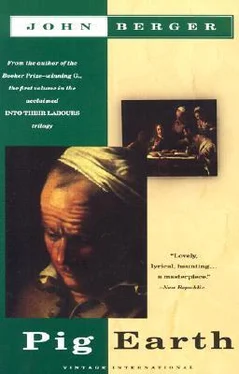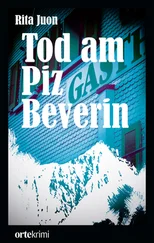Whenever a plate was empty, my mother piled more stuffed cabbage on to it.
“The thread of knowledge which nature doesn’t crush, like a thread of gold in the rock,” Pépé was saying.
The faces shone in the heat, and the table became more and more untidy. My mother brought on an apple tart the size of a small cart-wheel.
“And then I would like to go several thousand years into the future.”
“There’ll be no more peasants.”
“Not so sure! I didn’t say forty thousand, I said several thousand! I’d look down at them like the old crow looks at us!”
Unless I concentrated on stopping them revolving, the walls of the kitchen would not stay still. On the table with the apple tart were cups of coffee and bottles of gnôle. I gulped down some coffee.
“All farms will be on flat plains,” pronounced the schoolmaster.
The cold air of the courtyard cleared my head. At the end of the meal the guests left, saying, “Till the next time.”
I wanted an excuse not to go down to school. The chances were not good, for the only possible excuse was that I was needed for work, and there was not enough work for me to do. I held the pig’s forelegs whilst Pépé sawed the carcass into two from the back.
He put his shoulder under one of the sides, I unhooked it, he adjusted its weight, and he carried it across the courtyard, past the stone sabot, and up the outside wooden stairway to the room above the vaulted cellar. The side of the pig was longer than he was tall. He walked slowly, and on the stairway he stopped once. When he carried the second side, he stopped three times.
The next day he would cut the meat and lay it out neatly, like a flowerbed of pink delphiniums, on the trestle table. Every year he arranged it like this.

Then my mother would salt the meat in the wooden saloir and in six weeks Pépé and I would go looking for juniper branches for smoking the hams and the bacon.
The kitchen had been restored to its working tidiness. On the scrubbed table the women were cleaning the pig’s guts and preparing to make boudin from his blood. Reluctantly I went down the steep path to school.
When I came out I had to screw up my eyes against the falling snow. Mémé did not warn me about bringing snow on my boots into the kitchen, because she was crying. She and my mother had laid Pépé on his bed.
He had collapsed in the courtyard. Tomorrow the same neighbours who had eaten lunch with us would be returning to pay their last respects to him.
No mountain in the world was as still and as cold as his face. I waited for his face to move. I told myself I would wait all night. But its stillness outdid me.
I went out and crossed the courtyard to look at the stone sabot. There was enough moonlight for me to see it.
I heard Pépé saying again: “That is what I’d like to know if I was a crow on a tree watching …”
During the night more snow fell, and in the morning, on top of the pile in the courtyard, I saw an unexpected shape, draped in white. I had forgotten the pig’s head. Once more I ran full tilt up the side to the top. I brushed off the snow. The eyes were shut and the skin was as cold as ice. It was then that I started to howl. I do not know for how long I sat there, on top of the snow pile, howling.
The mother puts
the newborn day
to her breast
turnips
like skulls
are heaped
house high
before the blood has been washed
from the legs of the sky
ROUSA BELONGED TO the breed which is called Abondance, after one of three sister rivers which flow through deep gorges with many waterfalls to the lake. She was reddish-brown and white, the white patches mostly occurring on the inside of her legs, her underside and her dewlap, so that she gave the impression of being a reddish-brown cow who had just waded across a river of milk. She had had four calves. Four times a perfectly formed animal with reddish-brown and white fur, the stumps of horns, hooves, eyelashes, teeth, ears, sexual organs, had grown in the matrix between her wide haunches and been expelled. Four times the birth had released a flow of milk into her immense udder which was like a full moon coming up behind a hill.
Martine owned six cows, and of the six, Rousa gave the best milk. After she had calved she gave as much as twenty litres a day.
“Cows are like distilleries,” said Martine. “To have good milk, you need good pastures.”
Her chalet in the alpage was high up the mountain. And the butter she made there was considered to be the best in the village.
Martine was in her mid-fifties. Her husband worked in one of the saw-mills of the valley. In the alpage her companion was an old man whom everybody called Joseph, although his real name was Jean-Louis.
Joseph had no family and came from another part of the mountains. He claimed to have been a shepherd all his life, which was probably true, but nobody gave great credence to his claims because he usually made them when he was drinking. He lodged with Martine and her husband, and in exchange for his keep he worked for them. If somebody in conversation asked: which Joseph? he was always identified as Joseph, The Servant of Martine.
“Rousa has turned mad,” Joseph announced to her one evening.
“Why do you say that?”
“She’s had three inseminations and not one has taken.”
“We’ll try a fourth time.”
“She’ll be on heat twice a month and turn mad. You should have sold her before,” he muttered. “I said it when we were below.”
“She is the best cow we have.”
Martine had a light, lilting voice.
“I’ve been looking after cows for fifty years,” he grumbled, “fifty years.”
“You have no more wine, I think.”
She said this, getting up from the table. She did not allow him access to the few litres of wine she kept for herself or for the occasional visitor. And he, for his part, never laid in a large stock. He preferred to go down to the village on the occasion of taking down their cheeses or fetching some bread, and to come back with four or five bottles in his haversack.
He ignored the remark about his wine.
“Women!” he continued. “When I was alone in the mountains, I kept the jobs to be done on one side, and the finished jobs on the other, and it was simple. When a woman is around, nothing is simple.”
“Poor Joseph!”
“And now Rousa has turned mad!”
The chalet had one small dark wooden room like a sailing ship’s cabin. At the end furthest from the door was a wooden platform which served as a bed.
He shuffled to the door without a further word. His moods could change very rapidly. When he was happy he pretended to dance through the door. When he was despondent he left the room as if leaving the world to its own damnation.
The room ran parallel to the stable and was only separated from it by wooden planks. From her bed Martine could hear a goat piss. But if the wall had been a hundred times thicker, she would have heard the blow that woke her that night. It reverberated as if the whole chalet had been struck.
They both got to the stable at the same time.
“What happened?” Martine asked.
The old man had excited eyes and looked cheerful again.
Rousa was on her feet staring at the torch light. The other five cows were lying peacefully on the wooden floor. The goats stared with their usual contradictory expression of surprise and mockery.
“It wasn’t thunder,” said Joseph. “The sky is …”
Читать дальше













